
The Business of Fashion
Agenda-setting intelligence, analysis and advice for the global fashion community.

Agenda-setting intelligence, analysis and advice for the global fashion community.
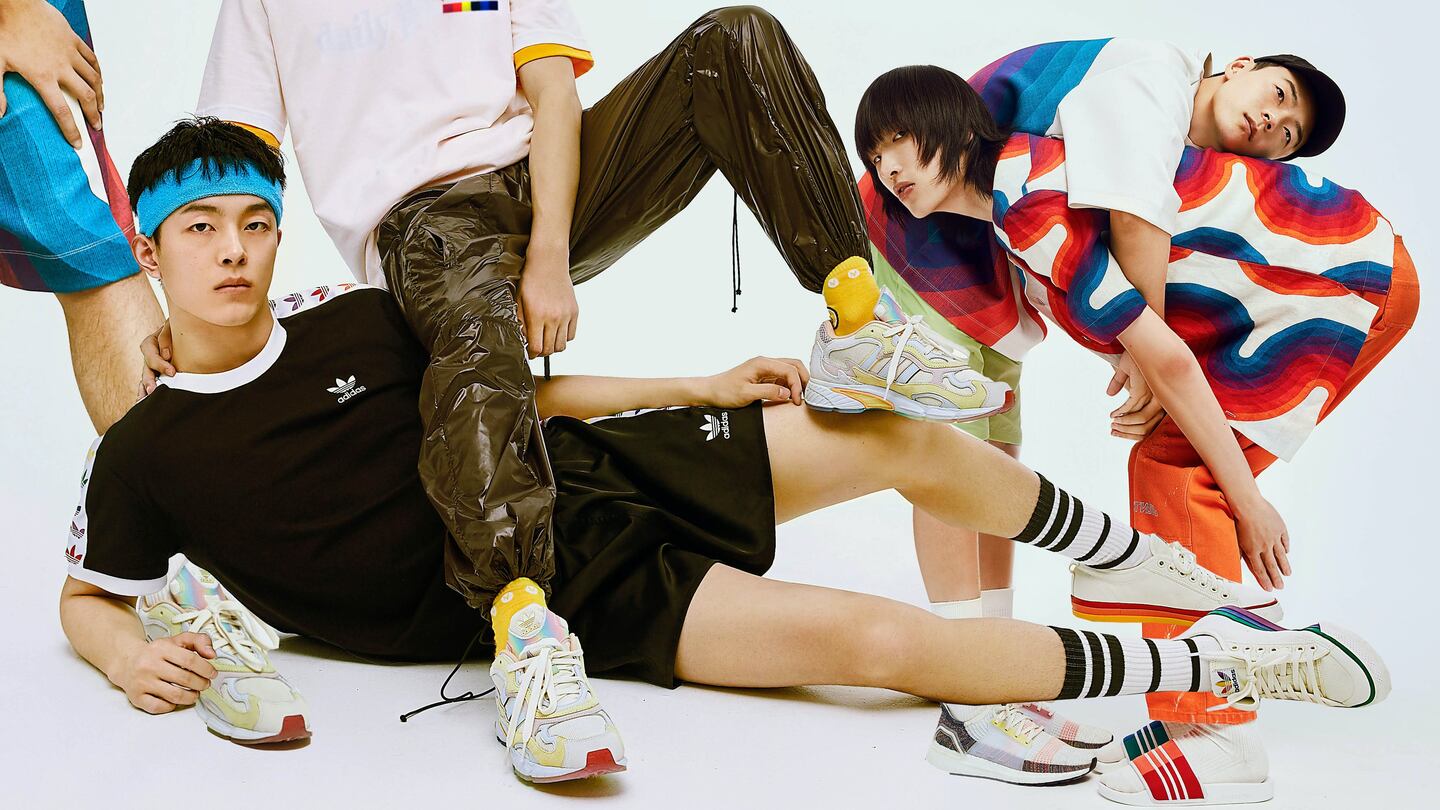
BEIJING, China — Last month, Taiwan became the first place in Asia to approve same sex marriage. The excitement spilled over into mainland China, where gay marriage is not permitted, with the trending topic #TaiwanOkaysGayMarriage# receiving 590 million views on Weibo.
Now, with Pride Month underway, fashion brands are pushing local limits by bringing their lesbian, gay, bisexual, transgender, queer or questioning and intersex (LGBTQI) campaigns to China.
Coach, Diesel, Nike, and Old Navy are all sponsoring Shanghai Pride, which runs from June 8-16, while Adidas, UGG, Levi's and Esprit are among the brands launching capsule collections they hope will resonate with the Chinese LGBTQI community and their supporters. Promoting Pride is consistent with a broader message shared by many fashion brands: that consumers can express their identities through their clothes.
As always in China, there’s a large and lucrative potential market. According to China Daily, the LGBTQI community in China numbers over 70 million and the demographic is worth an estimated $300 billion across industries. That number doesn’t include hundreds of millions more Chinese who might choose to express their solidarity with the community through their purchases.
ADVERTISEMENT
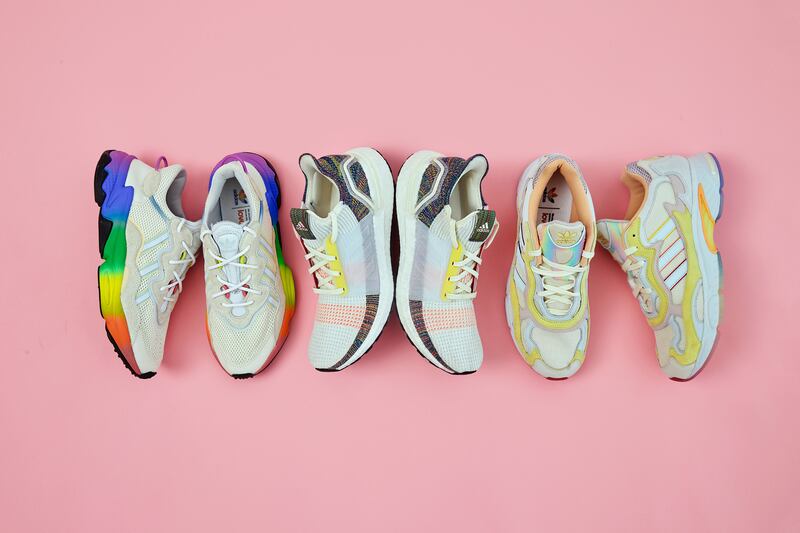
Adidas' 2019 Pride collection
But using fashion as a platform to champion social causes hasn’t caught on here in the same way that it has elsewhere. Some wonder whether consumers are ready to open their wallets to support a community that continues to face significant discrimination both politically and socially.
Promoting a pro-LGBTQI message is complicated in China. Homosexuality was illegal in the mainland until 1997, and it was still classified as a mental health disorder until 2001. LGBTQI themes continue to be censored in popular culture and on social media. References to Freddie Mercury’s sexuality and battle with AIDS were removed from Chinese screenings of Bohemian Rhapsody (2018), for example, and the topic #Les#, a discussion group for lesbians that has almost 700 million reads, was removed from Weibo in April.
Despite ongoing censorship of such content, a number of brands have decided to go ahead with their global Pride campaigns in China this year. Esprit’s “Every Stripe” collection, which integrates the Pride flag in designs by artists Craig Redman and Karl Maier, launches in China somewhat belatedly on July 4.
“Originally we didn’t decide to carry the collection [because] for many countries in Asia, gay marriage is illegal,” says Jinnie Wei, Esprit’s Marketing and Communications Senior Manager, Asia. Wei says consumer insight and social listening helped give the brand the confidence to go ahead with their Pride campaign in China in 2019.
“From some research we’re doing, Chinese people are ready to receive more emotional and high level [messages], not just thinking about fashion and how they look,” Wei says. “Chinese people now care much more about community and a sense of belonging than in previous years.”
With regards to the LGBTQI community specifically, she says, “In the past two years, Chinese people have become very open-minded.”
“May 17 was the International Day Against Homophobia, Transphobia and Biphobia, and the buzz was really high on Weibo. Tons of Chinese people are speaking up for LGBT[QI] people, so it really is the right moment for brands like us,” she says.
ADVERTISEMENT
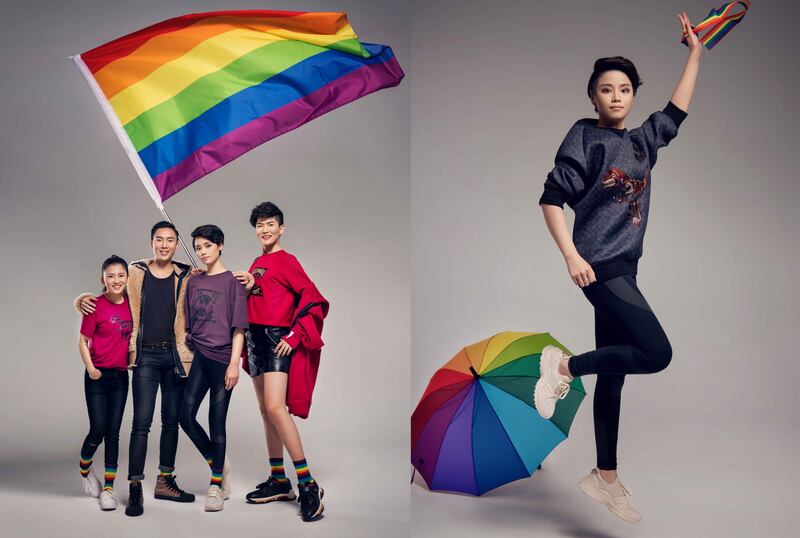
Coach's Shanghai Pride Campaign | Source: Courtesy
Raymond Phang, co-founder of Shanghai Pride, which this year turns 11, agrees that something has changed for global brands. He says that over the past three years Shanghai Pride asked Old Navy for T-shirts — to give their volunteers and the participants in their Pride week bike ride — without success. “Then last year they were like, yep! Let’s do it. They needed more time,” he says.
Coach and Diesel reached out to Shanghai Pride this year to explore ways to partner with them, instead of Shanghai Pride going to them.
“But we want brands to be more real than just giving us a product,” says Phang. “UGG came out with these rainbow, fluffy shoes. But we said, hey, we’re not going to have an event where we’re going to wear them out.”
He prefers it when, for example, Nike provides coaches and pacers to help with their run, or Coach agrees to shoot a glamorous visual campaign to promote not just their products but also the Shanghai Pride festival.
“When you use your company resources, or PR agencies or event partners, then they’ll know that Nike, for instance, supports LGBT[QI people and rights]. They are going to engage more people by organising an event,” Phang says.
We want brands to be more real than just giving us a product.
While a growing number of global fashion brands are willing to bring their Pride campaigns to China, and some of them are becoming more sophisticated in their engagement with the local LGBTQI community, it’s still a challenge to find people willing to market and wear their Pride collections because so few LGBTQI people in China are publicly out.
A 2016 study commissioned by the United Nations Development Programme and led by Professor Wu Lijuan of the Peking University Sociology Department found that only 15 percent of China's LGBTQI community were out to their families and only five percent were out publicly. By contrast, in the UK for example, 65 percent of respondents to the 2019 National LGBTQI Survey were out to all or most family members.
ADVERTISEMENT
“There aren’t many celebrities I know of who’d get involved in these types of campaigns because they know it’s a sensitive topic,” says Lauren Hallanan, author of “Digital China: Working with Bloggers, Influencers and KOLs.
“While there are a lot of influencers who are gay, especially in the beauty industry, I don’t know many of them who have openly come out to their fans,” she says. “I don’t think a lot of their audiences are coming to them to learn about what it’s like to be a gay man in China.”
Only 15 percent of China's LGBTQI community were out to their families and only five percent were out publicly.
While Chinese celebrities and influencers might present as LGBTQI in public, they rarely say so explicitly, Phang notes. The situation is the same for the many LGBTQI members that make up China’s fashion industry in cities like Shanghai, Beijing, Shenzhen and Guangzhou.
"[Dancer and television celebrity] Jin Xing is openly trans but she doesn't talk about it in media or in her work on TV," he says. She will talk about her identity at events such as The Economist's recent Pride and Prejudice Forum in Hong Kong, "just not in the mainland," he says.
The lack of public role models is a real challenge for the LGBTQI community in China, Phang says. “People need role models. When you have someone who is up higher to speak up for you, you have more courage to someday be that someone. You feel better,” he says.
The fact that Chinese celebrities, influencers and consumers are all more hesitant to publicly identify as LGBTQI necessitates a more subtle and strategic approach for brands promoting their Pride campaigns in China.
“Many people don’t want to be seen in public as gay, so we have a strategy to approach different levels of KOLs,” Esprit’s Wei says. “Some of them don’t see being seen as gay as a problem, but for instance when I’m seeding products to celebrities, the angle is not to say you are gay but to say you’re supporting love and equality and unity.”
Adidas seems to be taking a similar approach of seeding products, rather than asking celebrities to stand up for the LGBTQI community more directly. Patrick Ng, the APAC vice president of Adidas Originals says there are no particular Chinese celebrities promoting their Love Unite series, “but keep an eye out and spot them in the collection”.
Beauty influencer Dong Zichu (better known as his online persona Benny Bitch) has drawn over 3 million Weibo followers and 37,000 Youtube subscribers with his beauty and makeup videos. According to Dong, many people dare not speak about LGBTQI issues in China, and they shouldn’t feel pressured to do so.
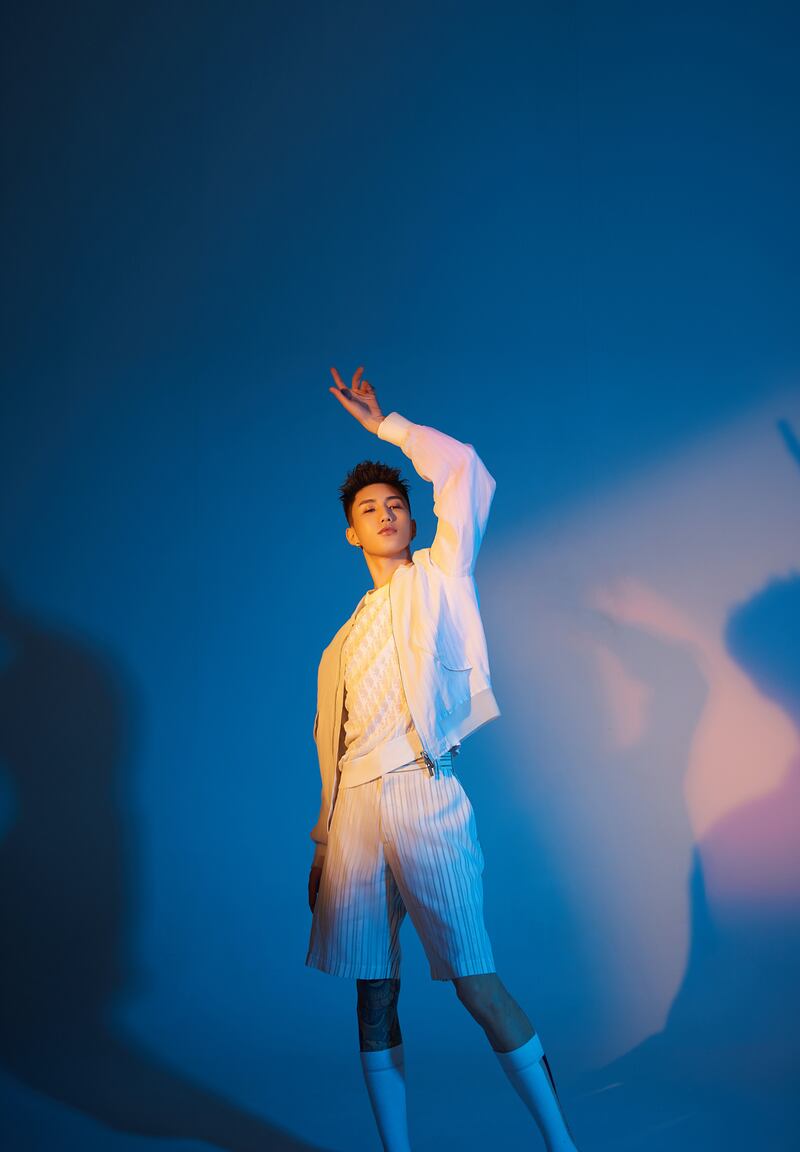
Beauty influencer Benny Dong | Source: Courtesy
“I am willing to speak for this group, I’ve done charity [for the LGBTQI community], and I am willing to speak for the AIDS community, but this is my personal choice,” he says. “Many people don’t want to, and that’s their personal choice.”
“Of course we hope that [celebrities] can be advocates, but only when they feel comfortable,” Phang says. “With travel or relationship advice KOLs, they might just take a picture [wearing] a shoe or a bag with a little rainbow. They might treat it as something they saw, or experienced from a third person view, rather than ‘I am’ or ‘I support’.”
For both brands and influencers, it’s reasonable to acknowledge a level of risk in promoting support for the LGBTQI community, given the state’s hostility towards its culture and rights.
"What is allowed to talk about or not allowed to talk about in China, there's never really a clear rule," says Shaway Yeh, founder of brand agency yehyehyeh and Group Style Editorial Director at Modern Media. "Maybe now it's okay, but next year it's not okay."
What is allowed to talk about or not allowed to talk about in China, there's never really a clear rule.
China continues to send extremely mixed messages. While Chinese state newspaper the People’s Daily praised Taiwan’s marriage equality ruling as a win for “local lawmakers” in a tweet that angered Taiwan’s Ministry of Foreign Affairs, An Fengshan, spokesman for the People’s Republic's policy-making Taiwan Affairs Office, was quick to reaffirm mainland China’s stance on gay marriage. "The mainland has a marriage system of one man, one woman," he said.
That leaves both global and domestic fashion brands with a tough decision to make.
“Does the brand really, really stand behind the cause, or is it just one of the causes it stands for? If it’s the latter, you can use another cause that has more resonance in China.” Yeh says. “If it’s the only cause they stand for, they can find a milder message. ‘Inclusive’ sounds much milder than ‘LGBT[QI] community’, and it’s not the same thing, but it touches on similar issues.”
That broader message of inclusiveness is one that’s being shared by a number of brands, including Adidas, here. Ng says their Love Unite series “is not only for the LGBT[QI] community, but rather Originals celebrating Pride with everybody.”
But whether or not that’s enough to excite consumers is another of the many uncertainties facing both brands and the LGBTQI community in China.
Additional reporting by Nino Tang.
时尚与美容
FASHION & BEAUTY
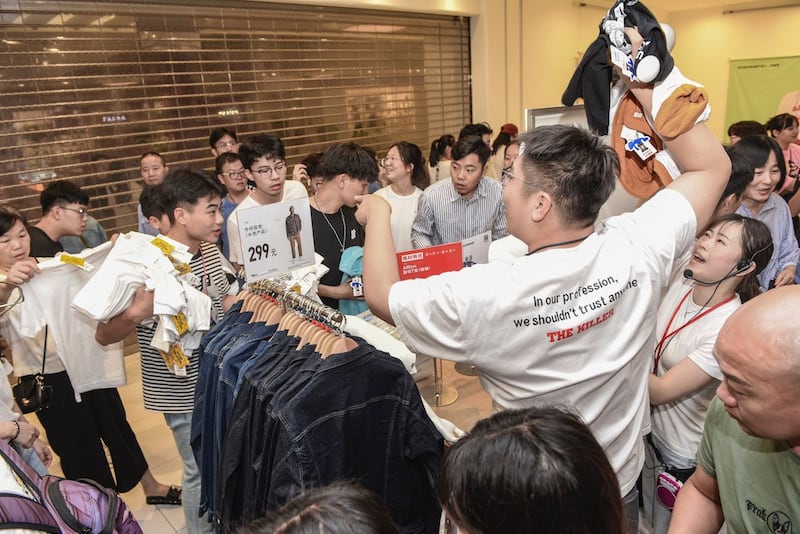
Customers crowd at a Uniqlo store to buy the Kaws x Uniqlo collaboration | Source: VCG/VCG via Getty Images
Manic Shoppers Snatch Up Uniqlo’s Kaws Collaboration
China's shoppers have gone crazy for the latest collaboration between the Japanese fast fashion giant and renowned American artist and designer Kaws, also known as Brian Donnelly, which dropped in stores across China June 3. While online stock was reportedly sold out in seconds, the collection quickly became a trending topic online with netizens posting photos and videos of shoppers clamouring to get into Uniqlo stores, pulling clothes off mannequins, and buying entire piles of T-shirts. Meanwhile, the T-shirts that were sold for $14 are being resold online for four to five times their original price. (What's on Weibo)
Chinese Millennials Are Popping Pills for Beauty
The mainland's beauty-obsessed millennials are taking anti-aging to the next level by consuming a cocktail of supplements, from collagen drinks to skin whitening formulas and metabolism-boosting powders. During Tmall's last Super Category Shopping Day, average spend on beauty supplements saw year-on-year growth of 70 percent, and pills are increasingly seen as an integral part of one's overall beauty regimen alongside skin care, spa and medical appointments and exercise. While some voices are fighting against China's pervasive "younger is better" narrative, the boom of "pretty pills" 'goes to show that the country's rigid beauty standards still dominate. (Jing Daily)
Adrian Cheng Named CFDA’s First Global Ambassador
In addition to China's Wendy Yu, the CFDA is adding yet another investor to its list of conduits to the Asian market. Adrian Cheng — the founder of K11 and C Ventures, and director and executive vice chairman of Chow Tai Fook and New World Development respectively — has been named the Council of Fashion Designers of America (CFDA)'s first global ambassador. The Hong Kong-based businessman will develop international initiatives and cross-cultural exchanges, in addition to supporting the council's educational programs and help US designers break into the Asian market. (BoF China)
科技与创新
TECH & INNOVATION
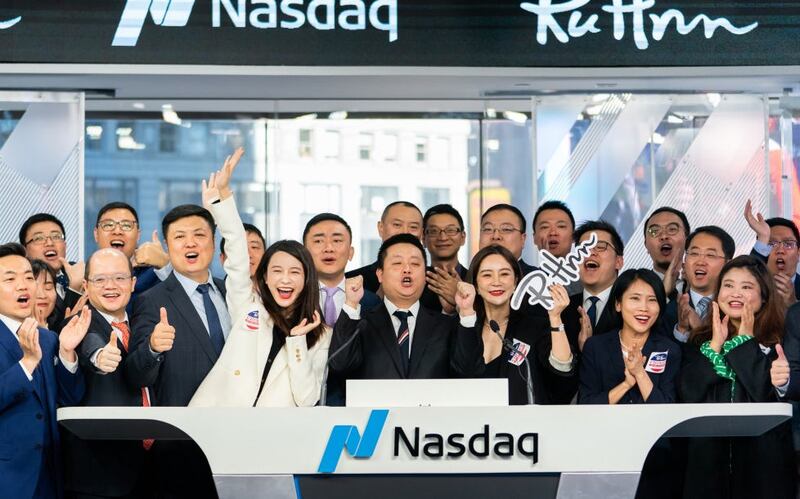
Ruhnn's US IPO | Source: Zhang Dayi's Weibo
Ruhnn Refutes Rumours of Investor Exodus
Influencer incubator Ruhnn has seen its stock price cumulatively plummeted over 53 percent to $3.77 since its listing (alongside market value drop of nearly 70 percent), igniting rumours that investors including Alibaba, Legend Capital, Saif Partners and Eastern Bell Capital exited the company, leaving founder Feng Min as its biggest shareholder. Ruhnn has since denied the rumours in an official statement, and said that said investors' shares are subject to a lock-up period for 180 days after listing, and have been neither sold nor transferred. (Sina Finance)
SoYoung Posts Strong First Quarter Results
Meanwhile, the future is looking bright for the social marketplace platform drawing eyes to China's $25 billion plastic surgery market. In SoYoung's first set of figures released after its IPO in May, the Beijing-based company published a net profit of 45.9 million yuan (around $6.6 million) in its first quarter — a year-on-year growth of 50 percent. Meanwhile, revenues hit 206 million yuan (around $30.7 million), a year-on-year increase of 81.2 percent. What's more is that the platform's monthly active users reached 1.92 million (a 78.7 percent from 2018): evidence that China's medical beauty boom is truly underway. (QQ)
China’s Short Video Apps are Trumping Online Payment Tools
By late 2018, 80 percent of China's 829 million netizens used short video apps such as Douyin and Kuaishou, according China's Internet Network Information Centre. This means that short video platforms are more prevalent than online payment tools. Importantly, more so than even social media apps, short video apps are easier to monetise, and viewers find it easier to trust KOLs (key opinion leaders) who create video content. While a majority of viewers are young, marketers shouldn't only focus on affluent urban-dwelling millennials: lower-tier cities — where there are fewer channels competing for consumers' attention — are where Douyin and Kuaishou are seeing the biggest growth. (Technode)
消费与零售
CONSUMER & RETAIL
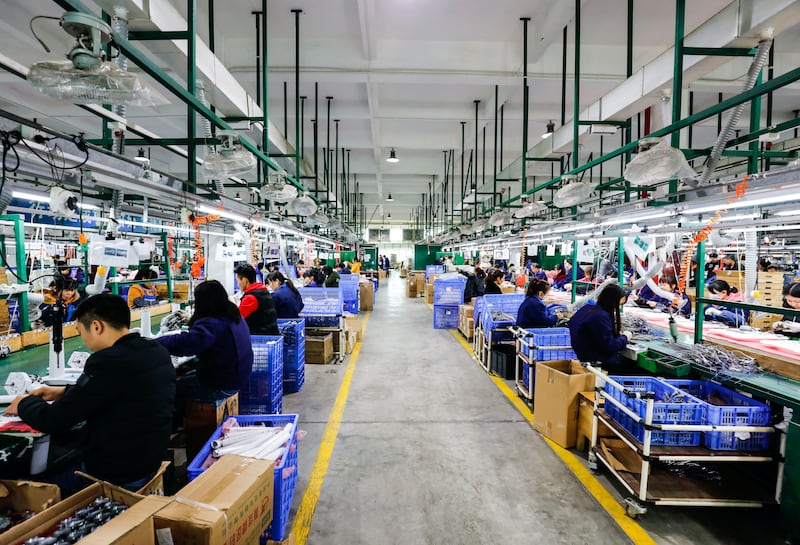
Source: Shutterstock
China’s Economic Slump Hasn’t Hit Rock Bottom — Yet
For the first time since February, China's manufacturing purchasing managers' index — a barometer for sentiment among factory operators — dipped into the negatives with a score of 49.4, a sign that local producers are being hit by the effects of the China-US trade war. As manufacturers brace themselves for a downturn, economists reckon that the country's slowdown has yet to hit bottom. On the consumption end, home-grown brands including White Rabbit Candy, Warrior Sneakers and newer brands are benefiting from a resurgence, as the Chinese government looks to boost the commercial value of domestic players. (SCMP)
Why is China's He-conomy Picking Up Now?
If millennial consumption habits are any indication, China's conservative male spending is a thing of the past. Thanks in part to China's huge gender imbalance (there are nearly 34 million more men than women), many of the country's men are now feeling the need to improve their style. What's more is that influencers and evolving gender roles are encouraging men to express their tastes in ways that would previously be deemed too feminine, and coveted luxury and streetwear brands are replacing cars, alcohol and real estate as a form of social currency. Peer pressure, a sense of excitement and collective identity have also drawn men to invest in more fashion than ever before. (36Kr)
618 Shopping Festival Focuses on Rural Consumers
For Alibaba's annual 618 shopping festival running from June 1 - 18, the retail giant is rolling out deals across its Taobao and Tmall platforms to target consumers in less-developed regions. Over 200,000 brands, retailers and merchants will use the occasion to target China's smaller cities and rural areas, who are becoming increasingly important to brands and retailers alike. According to Alibaba's 2019 annual results, about 70 percent of the company's 654 million annual active consumers are based in less-developed cities. Whether the trade war will affect the shopping extravaganza's turnout, however, remains to be seen. (Alizila)
政治、经济、社会
POLITICS, ECONOMY, SOCIETY
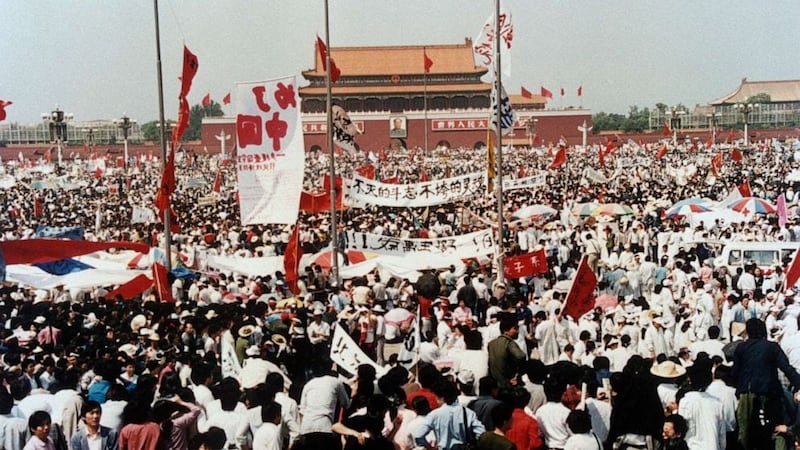
Protestors at Beijing's Tiananmen Square | Source: ABC News
Twitter takes down ‘a large number’ of Chinese-language accounts ahead of Tiananmen Square anniversary
June 4 marked 30 years since the Chinese military cracked down on pro-democracy protestors that gathered in the capital's Tiananmen Square, and while Beijing surprised many with a rare public acknowledgement of the event, its censorship of nationwide mentions of the incident shocked few. But many took notice when, mere days before the June 4 anniversary, Twitter reportedly suspended a large number of Chinese accounts for "engaging in mix of spamming, inauthentic behaviour, and ban evasion," including those belonging to critics of China's government. The deletions attracted criticism, but Twitter maintains that the "accounts were not mass reported by the Chinese authorities — this was a routine action on our part." (Telegraph)
China Issues US Travel Warning as Netizens Report Visa Denials
Amid escalating trade war tensions, China's foreign ministry and US-based embassies issued a travel warning on June 4, claiming that Chinese tourists have been interrogated, interviewed and subjected to other forms of "harassment" by US law enforcement. The alert — which urged US-based Chinese citizens and bodies to be cautious and respond "appropriately and actively" — comes alongside one issued by China's Ministry of Culture and Tourism, warning nationals of frequent shootings, robberies and theft. Meanwhile, Chinese social media has been flooded with stories of US visa and green card denials. (AP)
Chinese Database Exposes 42.5 Million Dating App Records
A researcher recently discovered tens of millions of user records across multiple dating apps on a single Chinese database that isn't password protected. Most of the records pertain to users from the US and UK, and includes IP addresses, geolocation, age and account names, and the researcher found that a subway line in Lanzhou, China was given as the owner's address. And following Beijing's publication of draft cybersecurity measures that would make it harder for foreign players to operate in China, the country's tech and privacy policies are coming under increasing scrutiny. (Cyberscoop)
China Decoded wants to hear from you. Send tips, suggestions, complaints and compliments to zoe.suen@businessoffashion.com.
With consumers tightening their belts in China, the battle between global fast fashion brands and local high street giants has intensified.
Investors are bracing for a steep slowdown in luxury sales when luxury companies report their first quarter results, reflecting lacklustre Chinese demand.
The French beauty giant’s two latest deals are part of a wider M&A push by global players to capture a larger slice of the China market, targeting buzzy high-end brands that offer products with distinctive Chinese elements.
Post-Covid spend by US tourists in Europe has surged past 2019 levels. Chinese travellers, by contrast, have largely favoured domestic and regional destinations like Hong Kong, Singapore and Japan.